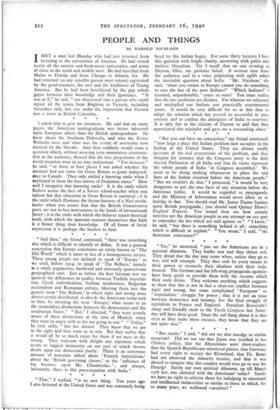" And then," my friend continued, " there was something
else which is difficult to identify or define. It was a general conception that Europe constitutes an entity known as The Old World' which is more or less of a homogeneous nature. These young people are inclined to speak of `Europe' as we used, before 1914, to speak of The Balkans,' namely as a small, pugnacious, backward and extremely quarrelsome geographical unit. Just as before the first German war we ignored the differences in quality between Turkish imperial- ism, Greek individualism, Serbian irredentism, Bulgarian nationalism and Rumanian culture, blurring them into the generic term The Balkans,' in which right and wrong were almost evenly distributed, so also do the Americans today seek to blur, by misusing the term Europe;' what seems to us the tremendous distinctions between the democracies and the totalitarian States." " But," I objected, " they were acutely aware of these distinctions at the time of Munich, when they were so angry with us for not going to war." " Today," he said, sadly, " this has altered. They know that we are in the right and they want us to win. But they realise that it would all be so much easier for them if we were in the wrong. They welcome with delight any argument which seems to suggest insincerity on our part or which throws doubt upon our democratic purity. There is an enormous amount of nonsense talked about Finnish imperialism,' about the British governing classes,' or the influence of big business upon Mr. Chamberlain' ; and always, insistently, there is this preoccupation with India."






































 Previous page
Previous page